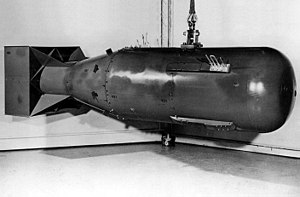Nuclear warfare is a type of war in which nuclear weapons are used to harm the enemy. Unlike conventional warfare, nuclear war is a type of war in which much more damage is done to a much larger area in a short time. The physical effects of nuclear war, unlike the effects of conventional warfare, will last for decades or centuries. Throughout history, the use of nuclear weapons on the battlefield has occurred only twice.
II. The nuclear weapons used by the United States of America (USA) in the cities of Hiroshima and Nagasaki, Japan at the end of World War II, are the only examples of nuclear weapons being used on the battlefield. II. After the end of World War II, with the development of nuclear weapons by the Soviet Union, the United Kingdom, France and the People’s Republic of China, nuclear armament spread, and the possibility of nuclear war increased. Especially during the Cold War, when the USA and the Soviet Union entered an arms race, the possibility of a major nuclear war reached its peak. With the disintegration of the Soviet Union in 1991, the Cold War era ended, and the possibility of nuclear war between the two nuclear superpowers was reduced. After this period, the danger of nuclear war left its place to the danger of proliferation of nuclear weapons and nuclear terrorism.
 “Small Boy” Nuclear Test at Nevada Test Site on June 14, 1962
“Small Boy” Nuclear Test at Nevada Test Site on June 14, 1962

The physical effects of a nuclear weapon vary according to more than one parameter. These parameters can be listed as the type of bomb, its power, the height at which it explodes, the weather conditions and the type of the target. For this reason, the effects of a nuclear weapon can only be described in a simplified way. The physical effects of nuclear weapons can be listed as ultraviolet light burst, electromagnetic blast, temperature, pressure, and ionizing radiation. The first effect people will notice when outside near the center point where the bomb was dropped is a burst of light. This burst of light, consisting of intense ultraviolet radiation, can temporarily blind people who look directly, although depending on the strength of the explosion. The electromagnetic throwing effect of the bomb is similar to the radio and television signals, but the power is very much. The power of the throw is damped by utility lines, antennas, long cables and other collectors. For this reason, electromagnetic radiation causes great damage to power and communication systems. The direct effect of electromagnetic radiation on humans is negligible. This is because people are less likely to retain a collector that would cause a fatal shock.
Nuclear weapons have been used in war twice, at the end of World War II. On August 6 and 9, 1945, the United States dropped atomic bombs on the Japanese cities of Hiroshima and Nagasaki. The world said “never again” but despite this, nine states together hold over 15,300 nuclear weapons, of which 4,120 are operationally deployed (Sipri, 2016).
The disarmament agreed upon by the largest nuclear-weapon states, the United States and Russia, in bilateral agreements is very slow, at the same time as the countries are investing in the modernization of weapons and smaller nuclear-weapon states are beginning to deploy nuclear weapons. As long as major powers and defense alliances base their security policies on nuclear deterrence, humanity is threatened with total devastation. Svenska Freds therefore demands an end to all development and testing of new nuclear weapons, that further proliferation be prevented and that the nuclear powers begin to phase out their nuclear arsenals as soon as possible.
In recent years, work has been carried out as part of the international campaign ICAN (International Campaign to Abolish Nuclear Weapons) to bring about an international ban on nuclear weapons.
“Ours is a world of nuclear giants and ethical infants. We know more about war than we know about peace, more about killing than we know about living. We have grasped the mystery of the atom and rejected the Sermon on the Mount.”
― Omar N. Bradley
We just think about killing. Nothing if the business comes to peace. Nuclear in reactors for energy production and other peaceful ways are understandable but no form of nuclear for war can be justified. We need to wait to see if we can keep the nuclear for the side of humanity not the war.

